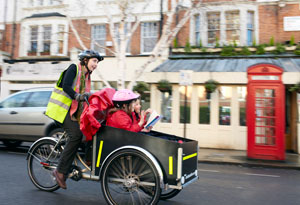The Pleasure of Pinching Pennies

The author, pedaling her daughters to school.
The only thing better than a decadent vacation? Scrimping and saving for one, says Carla Power, who savors the tension in figuring out what matters.
The school run was dreary this morning, wet and tiring, as I puffed my kids up a hill under a British drizzle. We don't have a car, not wanting to spend the money on it. So we rely on London's public transport, and a crazy little rickshaw-like bicycle from Denmark that my 8- and 5-year-old sit in, like mini pashas. There are many days when I long for the ease and warmth of a car. But on the steepest hill, I make myself weigh a bit of rain and sweat against the thousands we save on gas and car insurance a year. And then I calculate how I'm going to spend it. Today's calculation—of a Tuscan summer spent eating gelato and buying butter-soft leather shoes—powered me up the hill well in time for school.Thrift is often dismissed as the sort of Julie Andrews of virtues: familiar and comfortable, but hardly scintillating. Not so. Done right, deliberating how you spend has a hidden voluptuousness. Thrift allows you to appraise the world anew. It's about perusing life's possibilities, then homing in on the ones that make you happiest. Raised in a family of tightwads, I've known this for a while, but more people, it seems, are discovering it during these hard economic times. If you're trying to keep up with the Joneses, it's the Joneses who ultimately choose the kitchen or car you're going to buy. Thrift allows you to go explore the wilds of your own desires. For many of us, the current rediscovery of what my British friends call "mending and making do" feels more liberating than the go-go years ever did.
As the daughter of two Depression-era babies, I am hardwired for thrift. I grew up in a household run on economic principles as strict as Maoist China's. Spending on travel, theater tickets, and higher education was virtuous; spending on heating, good wine, or clothes was morally dubious. We measured our cars in decades, driving a 1965 Comet adorned with "Peace Now" stickers well into Jimmy Carter's administration. Our weekly trips to the local farmers' market always happened at dusk, for my father had figured out that when the sun began to dip, the vegetable prices did, too. And yet my father's bizarre money-saving measures weren't just about tightfistedness but a careful calibration of what was important in this life. If a summer in Europe meant winters of wearing frayed sweaters and eating drumsticks, he reasoned, so be it. If walking on antique Persian carpets meant sitting on a sprung and lumpy sofa, that was a price worth paying.
Now raising a family during a recession, I'm carrying on the tradition. I often work from home, but I won't turn on the heat during the day, figuring the chill keeps me alert. (Granted, sometimes the house gets so cold that I repair to the local café, often blowing a week's heating bill on cakes and cappuccino. Did I say that my economies were logical? I didn't.) My husband and I live with our two daughters in a fifth-floor walk-up. But climbing 92 stairs to get to our apartment means we can afford to live in a city we love—saving on gym bills as we do. Our dryer has been broken for years. We'll replace it, someday. Till then, we're drying our clothes on radiators, and have invested the money we save responsibly: on a week in the South of France.
Finite means, and deciding how to spend them, has a delicious tension that infinite means can't supply. If the lamp's genie had granted Aladdin limitless wishes instead of just three, where would the fun be in that? The link between thrift and being fully engaged with life's possibilities was recently noted by Barbra Streisand, of all people. Back before she got famous, she had to stretch her $45 clerk's salary all week. "Those were amazing times," she told a talk-show host, "when you have your future ahead of you, and the challenges of making that $45 last, and appreciating every penny."
"Thrift connects you, not just to people but to processes"
Photo: Mel Yates



